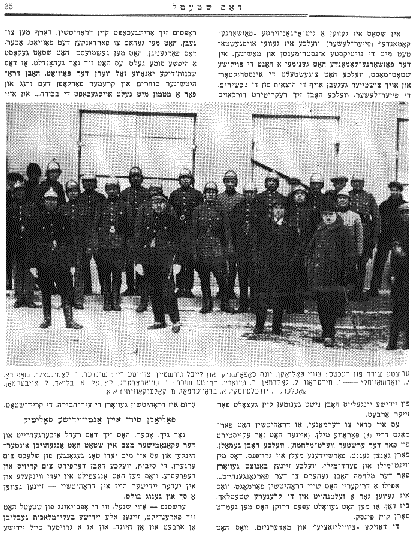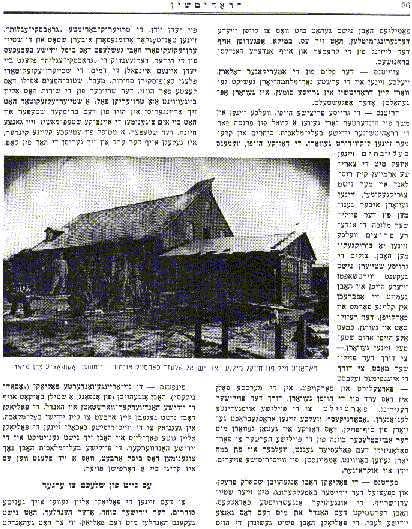Next Page
|
Previous Page
 [
Page 35
]
[
Page 35
]
The town had a good fire
department that was provided with the latest equipment and machinery. The
Polish city authorities were involved with the fire department, and provided
the instructors, and the costs of the machinery were covered by donations. The
firemen, who were recruited from among the Jewish men, were volunteers.
[Photo:] First Row, from right: Two Poles, Yonah Sapozhnik and Leibel Gurstein.
Second Row: Shinder, Y. Kaminetsky, Shapiro, L. Warshavsky --- Y. Siderov, L.
Goldman, B. Schwartz. Third Row: Y. Schwartzberg, Kotak, A. Bliakh, L. Oberman,
Kachler, D. Yudelevsky, A. Braverman, M. Kalenkovich, and others.
It should be mentioned that
Drohitchin owned three steam mills (one already existed before World War I)
that produced assorted flour and grain for the entire area. Windmills and
horse-driven mills used before the War belonged to the past.
Drohitchin even had a printing
press, which was a rare commodity in smaller towns. Prior to this time, if
someone wanted to get something printed, he had to travel to Pinsk. The new
results of civilization and modernity that suddenly flooded Drohitchin were all
due to the establishment of the district center. The fact was, however, that
the pleasure of having the district government cost a great deal of money. At
first it was expected that nearby Yanova would become the district center, but
Drohitchin merchants and storekeepers greased some hands along the way, and for
a small fortune were able to win the prize for Drohitchin. This was how
Drohitchin became the regional government center.
Poles start an anti-Semitic campaign
Very soon, however, the wheel
turned, and the economic situation in town
started declining, and each day things went from bad to worse. The reasons
causing the economic decline felt in every corner and in every Jewish home were
numerous and obvious.
First of all, construction in
town quickly came to a halt, and all the Jewish artisans were left without work
or an income; since a large number of Jewish
 [
Page 36
]
[
Page 36
]
families had no money for food, which obviously had an effect on the income of
shopkeepers and other businessmen.
Secondly, the flow of American
money that had been sent to Drohitchin in large amounts in the years after
World War I was now either held up or stopped. Third, the large landowner
estates, which were a source of income for Drohitchin Jewish artisans,
merchants and shopkeepers for hundreds of years, were liquidated. The Polish
government took over those estates while the owners retreated to Russia with
the Czarist army and never returned. Other landowners who did return couldn't
administer their estate because of high taxes, and had to break up them into
small farms and sell them. The result of this was that almost all estates
around Drohitchin were parceled out and sold, either through the Polish
authorities or the owners themselves.
[Photo:] The steam mill of Chaikel Miller and Yisrael Elazar Khorsel under
German occupation in 1916.
In most cases, the land of the estates was distributed by the Polish government
to the Polish legionnaires, the
osadniks,
who were relocated from central Poland. This was done with the express
intention of the Polish rulers to transform the Polesia region into a Polish
region, since previously it was mostly populated for a number of years by White
Russian peasants, Jews and Ukrainians.
Fourth, the Poles started
oppressing the population, especially the Jews, with harsh taxes. The tax
obligations strangled business, and therefore Jewish life. The Poles were
simply skinning the flesh of every Jew. Every day, the sorrowful and well-known
"Grabsky wagons" would go around Drohitchin, and the tax collectors
would confiscate the smallest bags from Jewish homes. Whenever they would see
the Grabsky wagons, Jews would turn pale. The tax collectors would confiscate
merchandise, furniture, household items, and even the last pair of pants. This
writer witnessed such sad events: a tax collector went into the house of the
Brisk quilt maker and confiscated his only quilt machine, which was his only
source of livelihood. He was a man burdened by many small children, fell down
on the ground and started tearing his hair out.
Fifth, the newly arrived Poles (
osadniks
) immediately started a quiet boycott of Jewish workshops and businesses. The
Poles gave no work to Jewish craftsmen, and in contrast to the White Russians,
the Poles were good tradesmen and wouldn't get anywhere near the Jewish
artisans. The Polish craftsmen even took away the smallest bit of work that a
Jew would get from village peasants.
Going from bad to worse
The Poles were also experiences
merchants, and a Jewish merchant or businessman could do business with the Pole
the way he did with
Previous Page
|
Next Page
This material is made available by JewishGen, Inc.
and the Yizkor Book Project for the purpose of
fulfilling our
mission of disseminating information about the Holocaust and
destroyed Jewish communities.
This material may not be copied,
sold or bartered without JewishGen, Inc.'s permission. Rights may be
reserved by the copyright holder.
JewishGen, Inc. makes no representations regarding the accuracy of
the translation. The reader may wish to refer to the original material
for verification.
JewishGen is not responsible for inaccuracies or omissions in the original work and cannot rewrite or edit the text to correct inaccuracies and/or omissions.
Our mission is to produce a translation of the original work and we cannot verify the accuracy of statements or alter facts cited.
 Drogichin, Belarus
Drogichin, Belarus
 Yizkor Book Project
Yizkor Book Project
 JewishGen Home Page
JewishGen Home Page
Yizkor Book Director, Lance Ackerfeld
This web page created by Lance Ackerfeld
Copyright © 1999-2025 by JewishGen, Inc.
Updated 3 Dec 2001 by LA
 [
Page 35
]
[
Page 35
]



